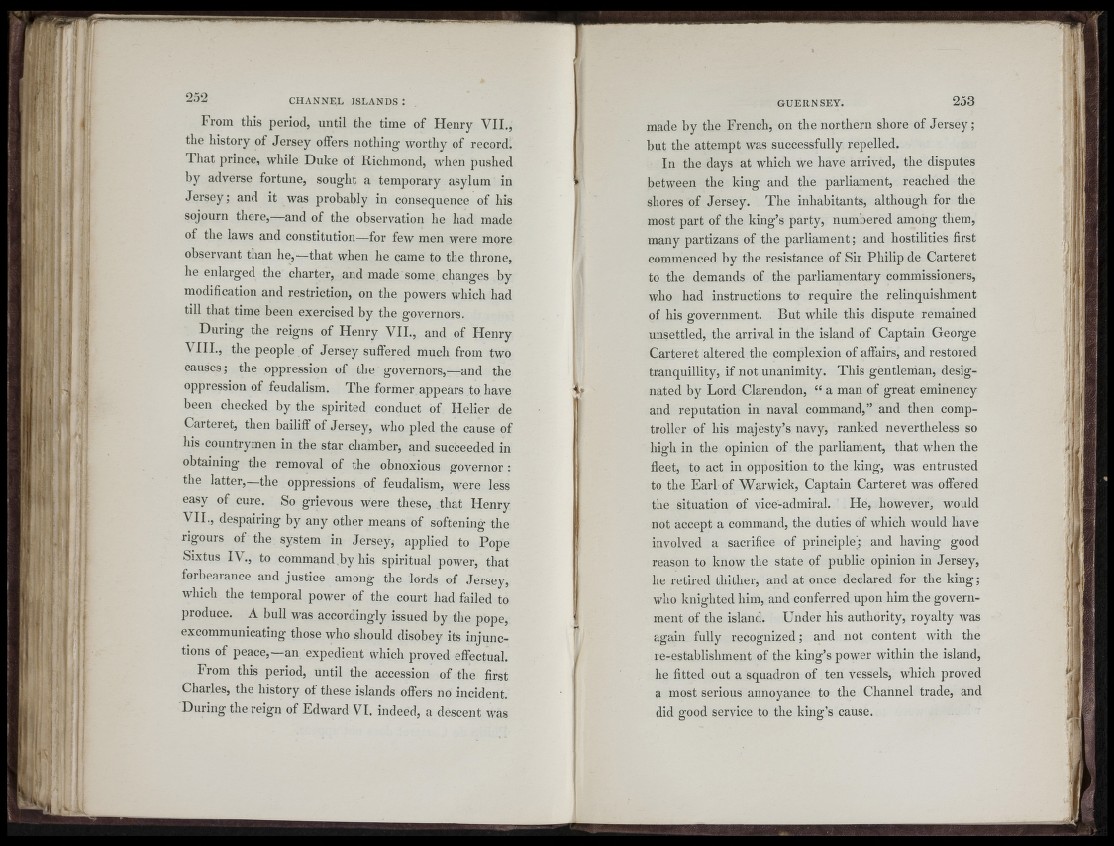
; I
V
’I ;
A
Ni l it
2 5 2 CHANNEL ISLANDS :
From this period, until the time of Henry VII.,
the history of Jersey offers nothing worthy of record.
T hat prince, while Duke of Richmond, when pushed
by adverse fortune, sought a temporary asylum in
Jersey; and it was probably in consequence of his
sojourn there,—and of the observation he had made
of the laws and constitution—for few men were more
observant than he,^—that when he came to the throne,
he enlarged the charter, and made some changes by
modification and restriction, on the powers vdiicli had
till that time been exercised by the gOA^ernors.
During the reigns of Henry VIL, and of Henry
VIII., the people of Jersey suffered much from two
causes; the oppression of the governors,—and the
oppression of feudalism. The former appears to have
been checked by the spirited conduct of Helier de
Carteret, then bailiff of Jersey, who pled the cause of
his countrymen in the star chamber, and succeeded in
obtaining the removal of the obnoxious governor :
the latter,—the oppressions of feudalism, were less
easy of cure. So grievous were these, that Henry
VIL, despairing by any other means of softening the
rigours of the system in Jersey, applied to Pope
Sixtus IV., to command by his spiritual power, that
forbearance and justice among the lords of Jersey,
which the temporal power of the court had failed to
produce. A bull aa^ s accordingly issued by the pope,
excommunicating those who should disobey its injunctions
of peace,—an expedient which proved effectual.
From this period, until the accession of the first
Charles, the history of these islands offers no incident.
During the reign of Edward VI. indeed, a descent was
GUERNSEY. 253
made by the French, on the northern shore of Jersey;
but the attempt Avas successfully repelled.
In the days at which we have arrived, the disputes
between the king and the parliament, reached the
shores of Jersey. The inhabitants, although for the
most part of the king’s party, numbered among them,
many partizans of the parliament; and hostilities first
commenced by the resistance of Sir Philip de Carteret
to the demands of the parliamentary commissioners,
who had instructions ta require the relinquishment
of his government. But while this dispute remained
unsettled, the arrival in the island of Captain George
Carteret altered the complexion of affairs, and restored
tranquillity, if not unanimity. This gentleman, designated
by Lord Clarendon, “ a man of great eminency
and reputation in naval command,” and then comptroller
of his majesty’s navy, ranked nevertheless so
high in the opinion of the parliament, that when the
fleet, to act in opposition to the king, was entrusted
to the Earl of Warwick, Captain Carteret was offered
the situation of vice-admiral. He, however, Avould
not accept a command, the duties of which would have
involved a sacrifice of principle; and having good
reason to know the state of public opinion in Jersey,
he retired thither, and at once declared for the king;
who knighted him, and conferred upon him the government
of the island. Under his authority, royalty was
again fully recognized; and not content Avitli the
re-establishment of the king’s power within the island,
he fitted out a squadron of ten vessels, which proved
a most serious annoyance to the Channel trade, and
did good serAuce to the king’s cause.
I
'I
t: j>1
Î
d
%